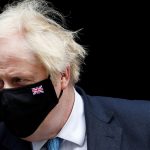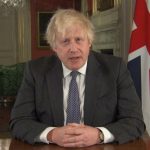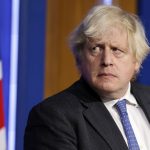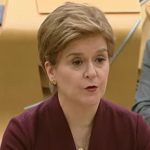David Cameron has said he was paid a “generous annual amount” which was “far more than I earned as prime minister” to lobby on behalf of a now-collapsed financial services firm.
Mr Cameron is appearing in front of two Commons committees to answer questions about his actions on behalf of Greensill Capital.
Follow lives updates as David Cameron faces questions from MPs
Please use Chrome browser for a more accessible video player
The former PM approached serving ministers and officials about the involvement of Greensill in government-backed financial support schemes during the COVID-19 crisis, lobbying that included dozens of calls and text messages to people including Chancellor Rishi Sunak.
He said he had a “big economic investment in the future of Greensill”, but declined to say how much he stood to gain financially.
“I was paid an annual amount, a generous annual amount, far more than what I earned as prime minister, and I had, shares, not share options but shares in the business, which vested over the period of time of my contract,” Mr Cameron said.
He continued: “I had a big economic investment in the future of Greensill, so I wanted the business to succeed, I wanted it to grow.”
“The fact that I have this economic interest in a serious economic interest that’s important, but I don’t think the amount is particularly germane to answering those questions, and as far as I’m concerned it’s a private matter.”
Mr Cameron defended his activities, saying he believes “deeply” in public services and “I would never put forward something that I didn’t believe was absolutely in the interests of the public good”.
In his opening statement to the Treasury Committee, he described having to face MPs and answer questions over his lobbying as a “painful day”.
Mr Cameron said he had “plenty of time to reflect” on what happened with Greensill and acknowledged “important lessons need to be learned”.
“This is a painful day, coming back to a place that I love and respect so much, albeit virtually, but in these circumstances,” he said.
“I have had plenty of time to reflect on what has happened. I welcome this inquiry and its related reviews, and I believe there are important lessons to be learned.”
Mr Cameron said former PMs should “think differently and act differently” when it comes to lobbying.
“Rules alone are never enough,” he said.
“We learnt that in this place over so many issues, personal conduct and codes of behaviour, and how such conduct and behaviour both appears and can be perceived, these things matter too.
“I completely accept that former prime ministers are in a different position to others because of the office that we held and the influence that continues to bring.
“We need to think differently and act differently.”
Asked about one of his messages about Greensill – to Treasury permanent secretary Sir Tom Scholar which ended “love DC” – Mr Cameron said he often used the sign-off.
“Anyone I know even at all well, I tend to sign off text messages with ‘love DC’ – I don’t know why, I just do,” he said.
“My children tell me that you don’t need to sign off text messages at all and it’s very old fashioned and odd to do so.”
He told MPs that Greensill founder Lex Greensill wanted him to “help grow” the firm – but insisted he only met the financier “very briefly” when he was advising his government.
Lobbying ministers and officials was never intended to be part of his role with Greensill, the former PM said.
He added that he had no sense in April 2020 – in the midst of him lobbying the government – that the firm was in danger of collapse.
Mr Cameron said he was a “regular” at Greensill board meetings but there was “no sense of jeopardy” about its future.






















